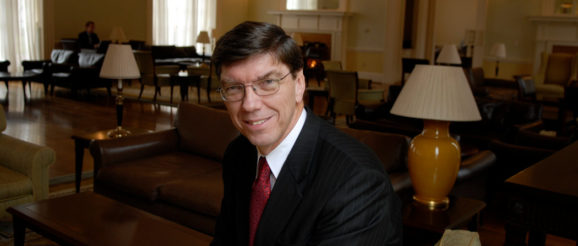Clayton Christensen, Guru of ‘Disruptive Innovation,’ Dies at 67 – The New York Times

Clayton M. Christensen, a professor at Harvard Business School whose groundbreaking 1997 book, “The Innovator’s Dilemma,” outlined his theories about the impact of what he called “disruptive innovation” on leading companies and catapulted him to superstar status as a management guru, died on Thursday at a hospital in Boston. He was 67.
The cause was complications of leukemia, Nitin Nohria, the dean of the school, said in a statement.
“The Innovator’s Dilemma,” which The Economist called one of the six most important business books ever written, was published during the technology boom of the late 1990s. It trumpeted Professor Christensen’s assertion that the factors that helped the best companies succeed — listening responsively to customers, investing aggressively in technology products that satisfied customers’ next-generation needs — were the exact same reasons some of these companies failed.
These corporate giants were so focused on doing the very things that had been taught for generations at the nation’s top business schools, he wrote, that they were blindsided by small, fast-moving, innovative companies that were able to enter markets nimbly with disruptive products and services and grab large chunks of market share. By laying out a blueprint for how executives could identify and respond to these disruptive forces, Professor Christensen, himself an entrepreneur and former management consultant, struck a chord with high-tech corporate leaders.

Andy Grove, then the chief executive of Intel, said at an industry conference about a year after “The Innovator’s Dilemma” was published that it was the most important book he had read in 10 years. That praise helped make the book a best seller (it had sold more than a half-million copies by 2007), and Professor Christensen a marquee name in the business world.
In 1976 he married Christine Quinn, whom he had met as a freshman at Brigham Young. She survives him, as do their children, Matthew, Michael, Spencer, Ann and Catherine Christensen; and nine grandchildren.
After graduating with an M.B.A. from Harvard in 1979, Professor Christensen joined Boston Consulting Group. He and a group of M.I.T. professors later founded Ceramics Process Systems Corporation, which he ran as chief executive for much of the 1980s.
He made the career switch into academia in 1992 when he joined the Harvard Business School faculty, and for many years he taught a course called “Building and Sustaining a Successful Enterprise.” He focused his theories on a wide range of industries, from education to health care.
“One of the things that gave my dad’s research such power was its credibility and practicality — having been a leader and executive himself, he knew what would be meaningful and relevant in the real world,” his oldest son, Matthew, said in a statement. “He knew that because of culture and inertia, sometimes the right thing to do was counterintuitive, perhaps even hard.”
When he first learned he had cancer, he decided to write about how he reconsidered his impact on the business world. In 2012 he published “How Will You Measure Your Life?,” a book, written with two co-authors, that was based on an article of the same name that had appeared in Harvard Business Review. In it, he recast his management theories as a formula for measuring how best to live one’s life.
